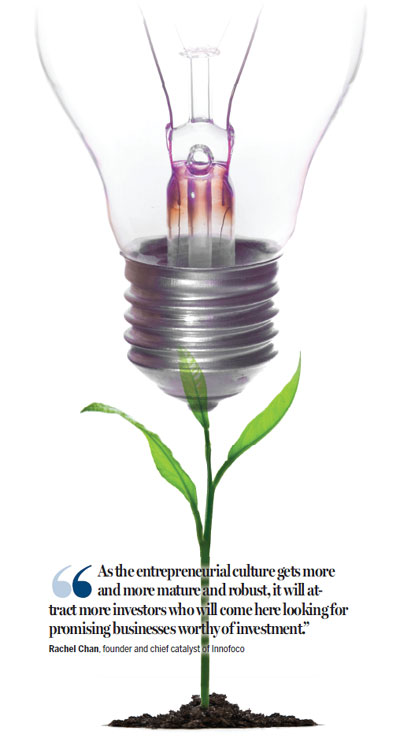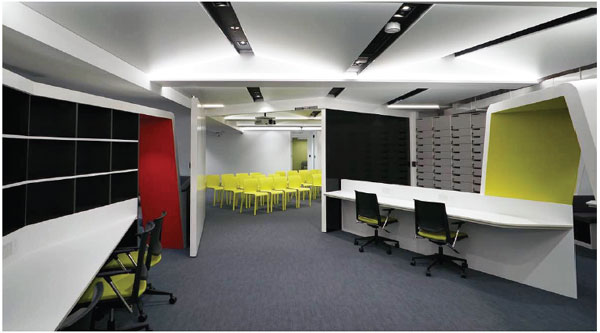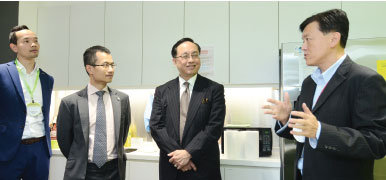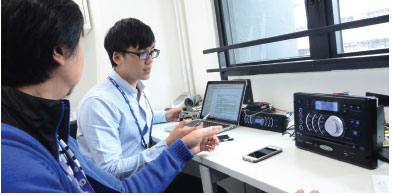Angel choir turns deaf ear to local startups
Updated: 2016-03-24 08:26
By Wang Yuke(HK Edition)
|
|||||||
Almost everyone is catching the buzz as HK strives to make its mark in new technology, but most investors are only looking for a quick buck. Wang Yuke reports.
The hunger for quick return on investment continues to smother Hong Kong's entrepreneurial spirit, says the Centre for Entrepreneurship at the Chinese University of Hong Kong (CUHK).
The concern comes as Hong Kong mounts ambitious plans to diversify the local economy, pull back from finance and property development and move up the ladder into high tech.
It's plain enough. The government has tried giving a wakeup call to the investor community. There are programs for helping startups and stirring innovation, but they're not working all that well. Exasperated, entrepreneurs say it's all but impossible to get their hands in the pockets of major companies and well-heeled individuals, when all startups have to offer is another high tech startup, risky enough as it is, and offering slow return on investment, even if it does succeed.
The government tried to sweeten the pot in the 2016-17 Budget last month. Chief Executive Leung Chun-ying committed building to a HK$2 billion investment for an Innovation and Technology Venture Fund. The idea was to provide matching capital with private venture capital.
The city is also trying to make plenty of room for the entrepreneurial spirit to expand. More space is being opened up for research and development. Science Park is adding another 70,000 square meters between now and 2020. It is committed to continuing its Corporate Venture Fund and incubation programs. Cyberport earmarked HK$200 million for funding startups. All but ignoring these efforts, suspicious investors with their eyes on quick return, stand on the sidelines like the wallflowers at a school dance.
Pang Shi-choi, 24, stands among the disenchanted. He joined the Jockey Club Incubation Programme for Social Innovation, offered by the Hong Kong Federation of Youth Groups and the Jockey Club. He came away with a capital infusion of HK$30,000 to develop an app for pop-up store owners who need temporary business premises. He'd already been in the real estate business and was confident he had plenty of good contacts to help him move his idea forward. After exhausting his list of contacts, he found out nobody cared. Colleagues and executives, he thought would prove to be strong allies, turned into strangers in the night.
Pang conceded gloomily that most big investors want in big money and fast. He knew his small idea couldn't meet those demands.
Local corporations and "the rich" are suspicious of startups. Quick money is their drug, says Marta Dowejko, a postdoctoral fellow at CUHK's Centre for Entrepreneurship. She headed a study trying to discover why Hong Kong's startup culture is so anemic. The study, "Crouching Tigers, Hidden Dragons", was published last April.
'Get rich quick'
Aversion to investing in startups is a part of a Hong Kong business culture that goes back generations, she has learned. Hong Kong is a trading hub where the "quick buck" has become a "deep rooted" business principle, she said.
Big local firms and wealthy individuals are no less open-handed than people who put their money in Silicon Valley startups, Dowejko emphasized. It's just that when the "get rich quick" mantra becomes a critical mindset, new ventures that are unlikely to see black ink before their fourth year are not very enticing.
The study found however that startups with fewer than 10 employees do more for the economy than established firms. They grow faster and hire more people, especially during the first years in business.
"It's easier to grow when the firm is small and startups offer innovation that established firms don't have," reckoned Dowejko. Although it may take startups a year to start generating profit, the study found the value added effect of startups nearly doubled over the next three years. "The rising trend does not continue in perpetuity," said Dowejko. "It cools gradually, after that."
On the ledger today, there are 1,600 local startups. That's a 50 percent increase over 2014, according to InvestHK. Hong Kong may be one of the most popular startup centers in the world, but the lack of funding still paints a pretty grim picture of the climate.
A study by Google in collaboration with CUHK's Centre for Entrepreneurship in April 2014 discovered that among 612 entrepreneurs surveyed, 88 percent relied on self-funding as their major source of seed capital. A meager 8 percent gathered their early-stage funding from venture capitalists. Only 1.8 percent of local venture capital and 21 percent of angel investor funding went to local startups between 2009 and 2013, the report said.
Hong Kong's startup culture is in its infancy. It hardly compares with the mature startup markets in the US and elsewhere, said Rachel Chan, founder and chief catalyst of Innofoco. Her mission is to help local, innovative businesses get rolling. "It is a matter of supply and demand. As the entrepreneurial culture gets more and more mature and robust, it will attract more investors who will come here looking for promising businesses worthy of investment."
Potential big returns
Potential investors in Hong Kong see only the high risks of new startups, and ignore the fact that innovative ideas that prove out can turn small risks into big returns.
The risk averse mentality sank in deeper, thanks to the dot-com bubble that burst around the Millennium, Dowejko said. Hong Kong investors who climbed aboard the dot-com bubble lost bundles of equity and investment in startups has never really recovered, added Dowejko.
Skepticism prevails especially among the older investment crowd. These are the ones who have played a part in building big successful companies. Many of them came here during the 1960's and 1970's and started their own companies to survive. Their days of taking big risks out of necessity are happily removed to the past, commented Dowejko. By contrast, she said, today's young entrepreneurs are motivation-driven and not driven by necessity.
Getting back to how startups are a major source of new jobs, the study pointed out that startups with fewer than 20 employees do a much better job than other segments of the economy. An average company starts with an average of 3.35 employees, grow to five employees by the end of the first year, and by the end of the fourth year, if they survive, in average eight employees.
Polled by InvestHK in August 2015, the respondents from 40 co-work space, incubator and accelerator locations in Hong Kong revealed that there were 3,721 employees at these startups, representing a 56 percent increase over a year ago. And there were 4,535 workstations available, a 60 percent year-on-year increase.
There are a few successful businesses in Hong Kong that started from nothing. One is Divide, less than five years old. It was founded by two people from Hong Kong and one from New York in 2011. The company's devise allows mobile phone users to have two phone numbers in one smart phones - one for private use and the other for business.
To fill the gap in capital ventures and angel investment, experts from Innofoco and Compass (a San Francisco-based research company, providing solutions for small and medium-sized businesses) agree that Hong Kong should look for potential investors outside Hong Kong. The likely solution is to provide incentive for global accelerators to come to Hong Kong, with special incentives for local startups already situated in the world's top startup ecosystems. In other words, Hong Kong startups need more international exposure.
Entrepreneurs, on the other hand, must keep looking and make sure that they attend every startup event they can find, noted Chan from Innofoco.
Contact the writer at jenny@chinadailyhk.com

|
The startup ecosystem in Hong Kong sees continued growth in terms of the number of startups and co-work spaces and incubators initiatives. |
|
|
|
A young entrepreneur is demonstrating the business to a guest. |
(HK Edition 03/24/2016 page6)


